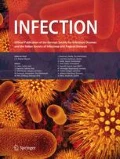Summary
The objective of the study was to evaluate the role of autoimmune mechanisms in the pathophysiology of protein S deficiency during HIV-1 infection. In a prospective study the correlation between protein S activity and the presence of anti-protein S autoantibodies or anti-cardiolipin antibodies in HIV-1-positive patients and in a population of patients without HIV infection was investigated. Fifty-five HIV-1-infected patients and 15 hospitalized patients without HIV infection were analysed for protein S activity (functional assay), complement system activation, presence of autoantibodies against protein S (Dot Immunobinding) and levels of anti-cardiolipin IgG antibodies (ELISA). The presence of anti-protein S antibodies was detected in 31 (56.36%) out of the 55 HIV-1-positive patients and in three (20%) of the 15 control patients (Fisher's exact test, p=0.012). The average value (± standard deviation) of protein S activity was 100.93 (14.73)% in the control group. For the HIV-1-infected patients it was 73.70 (20.67)% in those with anti-protein S antibodies compared to 88.08 (25.48)% in those without antibodies (Mann-Whitney U Test, p=0.01). In the HIV-1-positive group protein S activity was correlated with concentrations of circulating immune complexes (Spearman rank sum test, r=−0.41, p=0.018) and in the control group with concentrations of anti-cardiolipin antibodies (Spearman rank sum test, r=0.709, p=0.032). In conclusion, HIV-1 infection is associated with a high prevalence of antibodies against protein S. These antibodies are associated with a significantly low protein S activity. The exact correlation with plasma levels of these antibodies remains to be investigated.
Zusammenfassung
In der vorliegenden Studie wurden Untersuchungen zur Bedeutung von Autoimmunmechanismen in der Pathophysiologie des Protein-S-Mangels bei HIV-1-Infektion durchgeführt. Die Beziehung zwischen Protein-S-Aktivität und Antikörpern gegen Protein S oder Kardiolipin wurde bei Patienten mit HIV-1-Infektion und ohne HIV-Infektion prospektiv untersucht. In einem funktionalen Assay wurde bei 55 HIV-1-infizierten Patienten und 15 stationären Patienten ohne HIV-Infektion Protein S bestimmt sowie die Aktivierung des Komplementsystems, Vorliegen von Autoantikörpern gegen Protein S (Dot Immunbindung) und IgG-Antikörperspiegel gegen Kardiolipin (ELISA) gemessen. Bei 31/55 HIV-1-positiven Patienten (56,36%) und bei 3/15 (20%) Kontrollpatienten waren Antikörper gegen Protein S nachzuweisen (Fisher's exact test p=0,012). Die Protein-S-Aktivität betrug im Durchschnitt (± Standardabweichung) in der Kontrollgruppe 100,93 (14,73)%, bei HIV-Infizierten 73,70 (20,67)% bei Fällen mit Anti-Protein-S-Antikörpern und 88,08 (25,48)% bei Patienten ohne Anti-Protein-S-Antikörper (Mann-Whitney-U-Test p=0,01). In der HIV-1-positiven Gruppe korrelierte die Protein-S-Aktivität mit zirkulierenden Immunkomplexen (Spearman rank sum test r=− 0,41; p=0,018) und in der Kontrollgruppe mit Anti-Kardiolipin-Antikörpern (Spearman rank sum test r=0,709; p=0,032). Die HIV-Infektion ist folglich mit einer hohen Prävalenz von Antikörpern gegen Protein S und niedriger Protein-S-Aktivität assoziiert. Die genaue Korrelation dieser Antikörper mit Plasmaspiegeln muß noch bestimmt werden.
References
Stimmler, M. M., Quismorio, F. P., Mc Gehee, W. G., Boylen, T., Sharma, O. M. P. Anticardiolipin antibodies in acquired immunodeficiency syndrome. Arch. Intern. Med. 149 (1989) 1833–1835.
Sorice, M., Lenti, L., Misasi, R., Di Prima, M. A., Griggi, T., Cignarella, L., Vullo, V., Masala, C. Anti-glycosphingolipid antibodies in HIV infection. AIDS 5 (1991) 345–346.
Muller, S., Richalet, P., Laurent-Crawford, A., Barakat, S., Riviere, Y., Porrot, F., Chamaret, S., Briand, J. P., Montagnier, L., Hovanessian, A. Autoantibodies typical of non organ-specific autoimmune diseases in HIV-seropositive patients. AIDS 6 (1992) 933–942.
Lafeuillade, A., Alessi, M. C., Poizot Martin, I., Dhiver, C., Quilichini, R., Aubert, L., Gastaut, J. A., Juhan Vague, I. Protein S deficiency and HIV infection. N. Engl. J. Med. 324 (1991) 1220.
Pulik, M., Lebret-Lerolle, D. Déficit acquis en Protéine S libre au cours de l'infection par VIH. Ann. Med. Intern. (Paris) 143 (1992) 57–60.
Schved, J. F., Gris, J. C., Michaud, A., Amiral, J., Quicat, D., Arnaud, A., Martinez, P. Study of the protein S system in HIV-infected patients: acquired protein S deficiency or unsuitable assays? Blood Coagul. Fibrinolysis 3 (1992) 295–301.
Stahl, C. P., Wideman, C. S., Spira, T. J., Haff, E. C., Hixon, G. J., Evatt, B. L. Protein S deficiency in men with long term human immunodeficiency virus infection. Blood 7 (1993) 1801–1807.
Lafeuillade, A., Alessi, M. C., Poizot-Martin, I., Boyer-Neumann, C., Zandotti, C., Quilichini, R., Aubert, L., Tamalet, C., Juhan-Vague, I., Gastaut, J. A. Endothelial cell dysfunction in HIV infection. AIDS 5 (1992) 127–131.
Sorrice, M., Griggi, T., Fondacaro, L. M., Cignarella, L., Circella, A., d'Agostino, F., Misari, R.: Anti-protein S antibodies in AIDS. Proceedings of the 8th International Conference on AIDS, Amsterdam, 19–24 July 1992, Abstract PoB 3756.
Malia, R. G., Kitchen, S., Greaves, M., Preston, F. E. Inhibition of activated protein C and its cofactor protein S by anti-phospholipid antibodies. Br. J. Haematol. 76 (1990) 101–107.
D'Angelo, A., Della Valle, P., Crippa, L., Pattarini, E., Grimaldi, L. M. E., Vigano D'Angelo, S. Autoimmune protein S deficiency in a boy with severe thromboembolic disease. N. Engl. J. Med. 328 (1993) 1753–1757.
Author information
Authors and Affiliations
Rights and permissions
About this article
Cite this article
Lafeuillade, A., Pellegrino, P., Geoffroy, M. et al. Role of autoimmunity in protein S deficiency during HIV-1 infection. Infection 22, 201–203 (1994). https://doi.org/10.1007/BF01716703
Received:
Accepted:
Issue Date:
DOI: https://doi.org/10.1007/BF01716703

